Extended Lead ECG Speeds Diagnoses
Urgent care patients benefit from new 16-lead protocol
“The diagnostics are simply more precise with 16-leads,” says Jim Halsey, Manager of the Department of Respiratory Care at Stephens County Hospital in rural Toccoa, Georgia.
Every critical care ECG performed in the emergency room is done using the Philips PageWriter TC70 cardiograph (PDF) with advanced DXL 16-lead ECG algorithm.
Acquiring more information
The PageWriter TC70’s integrated 16-lead analysis takes advantage of right chest and posterior electrodes to provide extended interpretation for chest pain. The system then highlights those conditions requiring immediate clinical attention, with four easily understood and visible clinical values:
- Acute MI
- Acute ischemia
- Complete heart block
- Very high heart rate
“Prior to doing extended lead placement,” says Halsey, “there were only subtle signs that the patient was having an MI that was posterior based. Important data was lost because it wasn’t being picked up. With the new algorithm and additional leads, the ECG can be much more specific.”
In fact, Halsey’s team believes doing extended lead studies from the outset can mean fewer serial comparisons down the road. Once doctors have a reasonably confident diagnosis, further testing may not be required.
No time to waste
Speed to diagnosis is critical. Halsey is keenly aware of STEMI guidelines and believes the PageWriter TC70 can have a positive impact.
“From the time our ER physicians order an ECG to the time it’s completed is less than 15 minutes,” he says. “For ‘stat’ blood work it’s going to take somewhere between 45 to 60 minutes. If STEMI guidelines say diagnosis to treatment should be 90 minutes or less, and it is 30 minutes from here to our referral cardiology center, then getting a reliable diagnostic indication from the TC70 is a critical timesaver.”
Tangible benefits
With its easy 1,2,3 step operation, fully integrated pediatric interpretation and WiFi integration, the PageWriter TC70 is designed to meet the highest clinical standards for quality, accuracy and consistent performance.
“For a department manager like me,” says Halsey, “the selection is a no-brainer.”
READ Full Article (PDF)

